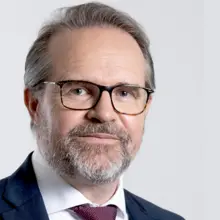The incumbent president’s re-election avoids an unpredictable political phase for France. Although Emmanuel Macron provides stability from an economic and a geopolitical standpoint, his narrower electoral base might be an issue in implementing his reform agenda.
Emmanuel Macron has won French presidential elections against far-right leader Marine Le Pen by 58.5% to 41.5%, confirming his leadership after five years in power. He has become the first incumbent president to be re-elected since the president and parliament terms were aligned on five-year terms. However, the outcome of the second-round race was much narrower than in 2017, and voter turnout was the lowest since 1969. The French political landscape is increasingly fragmented, with more than half of the votes going to populist candidates in the first round. However, the strength of the institutions of the Fifth Republic are often underestimated, and they have shown their ability to ensure a stable government in many challenging circumstances in the past.
During the second part of the campaign, Macron had to make several concessions to his left wing, including on the retirement system reform, and to endorse social measures to support household purchasing power. Moreover, several opposition leaders from each side of the political spectrum gave their support Macron but clearly in order to oppose Marine Le Pen without subscribing to his platform. This and the low voter turnout means that his electoral base is not as large as the second round results suggest, and his freedom of action will be limited particularly on the most difficult reforms. In this context, there is a risk that a social movement similar to the Yellow Vest one will appear as new reforms are initiated.
The French presidential election outcome is a success for Europe and a guarantee of stability for the Eurozone
The debate between Macron and Le Pen made it clear that this election was a referendum on Europe. The French presidential election outcome is therefore a success for Europe and a guarantee of stability for the Eurozone. Macron’s pro-European manifesto clearly showed support for more European integration and enhanced European autonomy in an evolving geopolitical context. Political continuity will also reassure NATO countries on France’s foreign policy. Macron wants to “ensure the power of Europe” with a focus on energy, technology and defence. This includes accelerating decarbonisation and deploying clean energy to reduce dependence on imported coal, gas and oil. Europe’s technological autonomy was often mentioned during his campaign. Macron calls for more investments to support European champions and more protection in the most strategic areas. He will also support a strengthening of European armies’ capabilities and their coordination. At the EU level, Macron highlighted several reforms as priorities, including new fiscal rules, a renewed common energy market, and a new governance set-up for the EU.
Macron’s next challenge is to secure a majority in the lower house (Assemblée Nationale) in two-round parliamentary elections, on 12 and 19 June. Left and right populists parties want to benefit from the momentum of the presidential election and secure a large number of seats. However, the voting system makes it difficult for these candidates to succeed in the second round. Moreover, the electoral premium given by the presidential election has always been sufficient to ensure a large number of seats for the president’s party. It is likely that Macron’s majority will be made up of a coalition that includes centre-left and centre-right MPs, as was the case in the previous parliament. Yet there is a risk this majority will be more difficult to achieve, since the traditional political parties have lost their voting shares and are deeply undermined by their poor results in the first round of the presidential election (below 5% for the Socialist Party and Les Républicains). Although a hung parliament looks unlikely, strong populist opposition could block any significant reforms and in particular constitutional reforms, which require a three-fifths’ majority of both the lower and the upper house (Senate). Despite a narrower electoral base and probably a weaker majority in parliament, Macron should still be able to pursue part of his plans to transform the French economy and improve EU governance.

